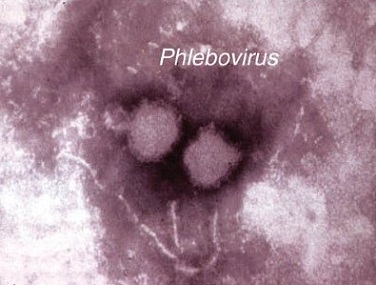Medical News: Novel Phlebovirus Strain That Causes Malaria-Like Sickness Discovered In Peru!
Nikhil Prasad Fact checked by:Thailand Medical News Team Dec 09, 2023 2 years, 2 months, 4 days, 15 hours, 45 minutes ago
Medical News: In the relentless pursuit of understanding and combating emerging viruses, a recent discovery has sent shockwaves through the scientific community. A novel phlebovirus variant, manifesting symptoms reminiscent of malaria, has been unearthed in Peru. This new discovery demands a thorough investigation to fathom its potential implications for public health. Initial reports surfaced initially on social media, and subsequent detailed information was disseminated through various publications and
Medical News reports.
 Novel Phlebovirus
Identification of the Novel Virus
Novel Phlebovirus
Identification of the Novel Virus
The patient zero for this unprecedented phlebovirus variant was a 20-year-old man in Peru exhibiting symptoms akin to malaria and dengue. This virus has been identified as a variant of the Echarate virus, belonging to the phlebovirus family.
Notably, phleboviruses, transmitted by sandflies, mosquitoes, or ticks, pose a substantial public health risk. The symptoms include high fever, severe headaches, muscle pain, and, in severe cases, meningitis. Recognizing the urgency, the WHO, UK Health Security Agency and U.S. CDC emphasized the importance of vigilant monitoring of patients with fever-induced illnesses to promptly identify potential emerging pathogens.
Origin and Genetic Composition of the Virus
The origin of this new phlebovirus variant has raised substantial concerns among scientists. Genetic analysis reveals that it is an Echarate phlebovirus that has naturally incorporated genes from an unidentified phlebovirus through genetic recombination. While the current risk level associated with this virus is deemed low, ongoing surveillance remains crucial, given its potential presence in the jungles of Peru.
Study Methodology and Findings
The study, conducted as part of passive clinic-based surveillance for acute febrile illnesses in Peru, involved a 20-year-old man working in civil construction. Admitted to the hospital with symptoms indicative of a tropical infectious disease, the patient's blood samples were subjected to various laboratory tests.
The symptoms exhibited by the infected patient, including fever, malaise, chills, systemic muscle pain, arthralgias, generalized head pain, drowsiness, photophobia, retroocular pain, and anorexia, closely mimic those of other tropical diseases prevalent in the region, such as dengue and malaria. This further complicates the timely identification and differentiation of the novel phlebovirus from existing infectious diseases.
The virus, identified as a novel Echarate phlebovirus variant, was isolated through genome characterization and p-distance analyses. The study revealed that the virus likely originated through a natural reassortment of
the Echarate virus with an unidentified phlebovirus, resulting in a unique combination of genetic material.
The study's comprehensive methodology, involving the inoculation of the patient's serum sample into African green monkey kidney cells and Aedes albopictus mosquito cells, highlighted the distinct cytopathic effects observed in Vero cells. The subsequent immunofluorescence assays using polyclonal antisera against various viruses further confirmed the uniqueness of the isolated virus, reacting specifically to bunyaviruses polyclonal antibody.
Further molecular analysis, including RNA extraction, genome amplification, library preparation, and sequencing, supported the identification and characterization of the novel virus. Phylogenetic analyses placed the virus within the Candiru virus complex, closely related to Echarate virus but forming a distinct clade within the complex.
Implications
The discovery of the novel phlebovirus variant in Peru underscores the constant threat of emerging infectious diseases. While the risk from this specific virus is currently considered low, the need for ongoing surveillance, research, and ecologic studies cannot be overstated. The case serves as a poignant reminder of the dynamic nature of viruses and the importance of proactive public health measures in response to such developments.
While the virus is currently classified as a low-risk pathogen, the potential implications of a novel phlebovirus circulating in the jungles of Central Peru warrant continuous scrutiny. The unique genetic composition, resulting from genetic recombination, adds a layer of complexity to the understanding of the virus's evolution and transmission dynamics.
The genetic analysis, crucial for understanding the virus's origin, revealed a natural reassortment of the Echarate virus with an unidentified phlebovirus. This recombination event is a rare occurrence, emphasizing the virus's potential to adapt and evolve, posing challenges for surveillance and detection efforts.
The implications of this discovery extend beyond the borders of Peru. As a global community, the collaborative effort to comprehend, monitor, and respond to emerging infectious diseases becomes paramount. The continuous evolution of viruses demands a proactive approach to mitigate potential threats and protect public health worldwide.
In conclusion, the discovery of the novel phlebovirus strain in Peru serves as a stark reminder of the ever-present risk of emerging infectious diseases. The intricate genetic makeup resulting from a natural reassortment underscores the virus's adaptability and poses challenges for timely identification and differentiation from existing tropical diseases.
Ongoing surveillance, ecologic studies, and collaborative efforts are imperative to unravel the virus's prevalence, transmission dynamics, and potential impact on public health. As we navigate the evolving landscape of infectious diseases, the proactive approach advocated by the scientific community becomes paramount in safeguarding global health.
The study findings were published in the peer reviewed journal: Emerging Infectious Diseases.
https://wwwnc.cdc.gov/eid/article/29/9/23-0374_article
For the latest
Medical News, keep on logging to Thailand Medical News.
